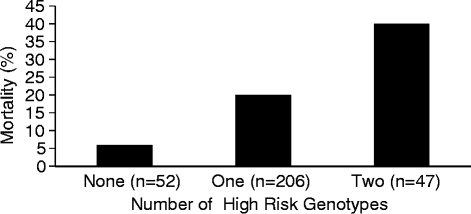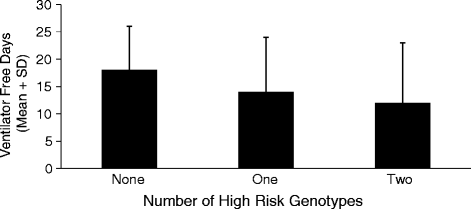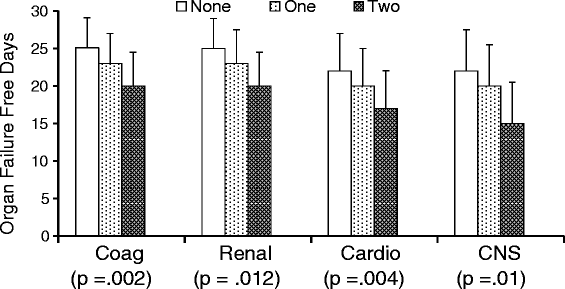Association of common genetic variation in the protein C pathway genes with clinical outcomes in acute respiratory distress syndrome
- PMID: 27215212
- PMCID: PMC4876559
- DOI: 10.1186/s13054-016-1330-5
Association of common genetic variation in the protein C pathway genes with clinical outcomes in acute respiratory distress syndrome
Abstract
Background: Altered plasma levels of protein C, thrombomodulin, and the endothelial protein C receptor are associated with poor clinical outcomes in patients with acute respiratory distress syndrome (ARDS). We hypothesized that common variants in these genes would be associated with mortality as well as ventilator-free and organ failure-free days in patients with ARDS.
Methods: We genotyped linkage disequilibrium-based tag single-nucleotide polymorphisms in the ProteinC, Thrombomodulin and Endothelial Protein C Reptor Genes among 320 self-identified white patients of European ancestry from the ARDS Network Fluid and Catheter Treatment Trial. We then tested their association with mortality as well as ventilator-free and organ-failure free days.
Results: The GG genotype of rs1042580 (p = 0.02) and CC genotype of rs3716123 (p = 0.002), both in the thrombomodulin gene, and GC/CC genotypes of rs9574 (p = 0.04) in the endothelial protein C receptor gene were independently associated with increased mortality. An additive effect on mortality (p < 0.001), ventilator-free days (p = 0.01), and organ failure-free days was observed with combinations of these high-risk genotypes. This association was independent of age, severity of illness, presence or absence of sepsis, and treatment allocation.
Conclusions: Genetic variants in thrombomodulin and endothelial protein C receptor genes are additively associated with mortality in ARDS. These findings suggest that genetic differences may be at least partially responsible for the observed associations between dysregulated coagulation and poor outcomes in ARDS.
Figures



Comment in
-
Genomics and pharmacogenomics of sepsis: so close and yet so far.Crit Care. 2016 Jul 7;20(1):185. doi: 10.1186/s13054-016-1374-6. Crit Care. 2016. PMID: 27384443 Free PMC article.
References
Publication types
MeSH terms
Substances
Grants and funding
- HL103836/HL/NHLBI NIH HHS/United States
- HL51856/HL/NHLBI NIH HHS/United States
- N01-HR-16146-54/HR/NHLBI NIH HHS/United States
- N01 HR016146/HR/NHLBI NIH HHS/United States
- HL110969/HL/NHLBI NIH HHS/United States
- R01 HL131621/HL/NHLBI NIH HHS/United States
- K24 HL103836/HL/NHLBI NIH HHS/United States
- HD047349/HD/NICHD NIH HHS/United States
- R37 HL051856/HL/NHLBI NIH HHS/United States
- N01-HR-46046-64/HR/NHLBI NIH HHS/United States
- K12 HD047349/HD/NICHD NIH HHS/United States
- HL112656/HL/NHLBI NIH HHS/United States
- R21 HL112656/HL/NHLBI NIH HHS/United States
- U01 HL081332/HL/NHLBI NIH HHS/United States
- R01 HL110969/HL/NHLBI NIH HHS/United States
- K23 HL085526/HL/NHLBI NIH HHS/United States
- KL2 RR024130/RR/NCRR NIH HHS/United States
- HL131621/HL/NHLBI NIH HHS/United States
- R01 HL051856/HL/NHLBI NIH HHS/United States
LinkOut - more resources
Full Text Sources
Other Literature Sources
Miscellaneous

